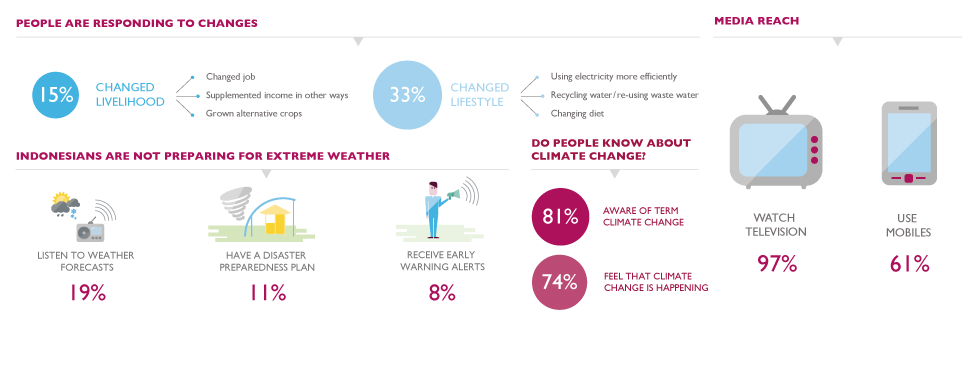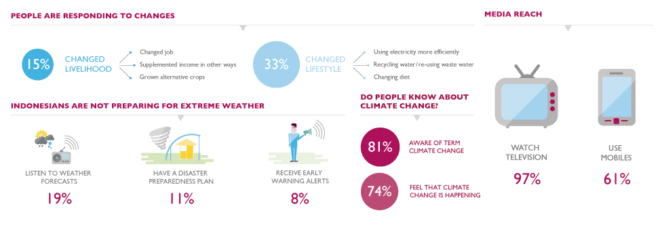Perceptions of Climate Change in Indonesia

The Climate Asia project
Climate Asia is the largest ever study of people’s experience of climate change in seven countries – Bangladesh, China, India, Indonesia, Nepal, Pakistan and Vietnam – involving the collection and analysis of survey data from over 33,500 people. This unique data provides information for governments, donors, the media, NGOs and everyone who wants to support people to adapt to the changing environment.
Country Infographic

Context
Indonesia has undergone rapid recent development and life has improved for most people. But the country’s development has taken a toll on the environment.
People feel the number of trees and animals have decreased. In addition people have noticed changes in climate with more than half feeling it is hotter and the weather is less predictable.
In rural areas, Indonesians feel changes in climate are contributing to declining crop productivity and making fishing more difficult and dangerous. People in large cities are particularly concerned about the impact of extreme weather, which is not only disrupting their lives now but causing them to worry about the future.
Despite this concern, Indonesians are preparing less for extreme weather events than people in any other Climate Asia country. For example, only one in ten has a disaster preparedness plan.
Those who are most affected by changes in climate are generally taking simple actions such as storing water, keeping food for longer and using fertiliser to improve soil quality. However, poorer people with less education are struggling to act. Across all groups, people felt that they needed government support to respond to changes in climate.
Communication
Current efforts to communicate are having an effect. People who had received communication were much more likely to feel informed about how to respond to the changes they noticed.
Indonesians are willing to make changes to their work and lifestyles in order to respond to climate change and feel a responsibility to do so. However, the decisions people face are complex and it’s important that they have enough information to discuss these issues and make decisions for themselves and with their communities.
Television reaches almost everyone in Indonesia so there is an opportunity to provide information on a national scale. Popular formats such as dramas and reality shows resonate with audiences and provide an opportunity to explore complex issues as well as inspire people with examples of how communities like theirs can take action.
People trust their local neighbourhoods to provide solutions. Local opinion-formers, including religious, traditional and elected local leaders, are an important channel of information into communities.
Current communication tends to focus on the long-term impacts of climate change, but people feel impact now. There is an opportunity to encourage action and make climate change relevant to people’s lives by framing communication around the impact they feel and the things they value, for instance by focusing on making money or staying healthy.
Findings
93% of people had watched TV in the past day.
54% say following their religious and moral beliefs is their most important value.
96% of people trust community leaders. 94% of people trust local elders and religious leaders.
71% said that not having enough resources to respond and needing government support (84%) are the main barriers to taking action.
58% of people would most like to receive information on these issues through television.
57% do not feel informed about how to respond to changes in climate and resources.
88% are confident that their local neighbourhood can deal with climate related issues.
63% said the number of trees had decreased.
(0) Comments
There is no content